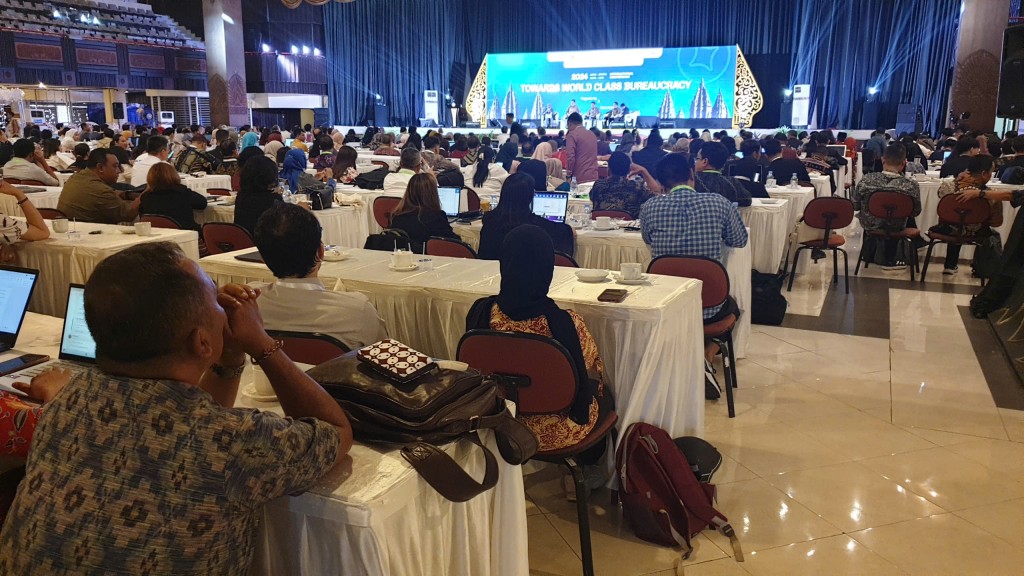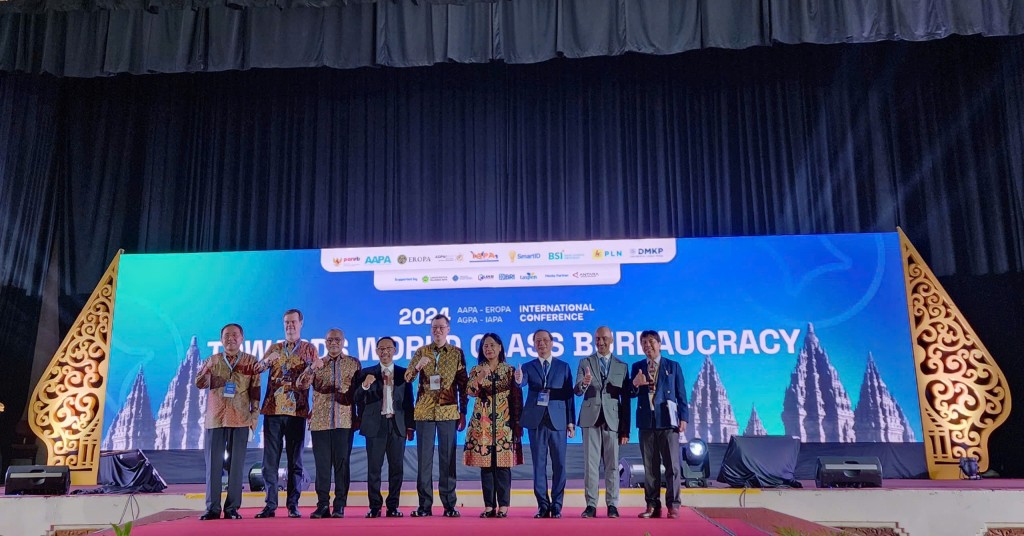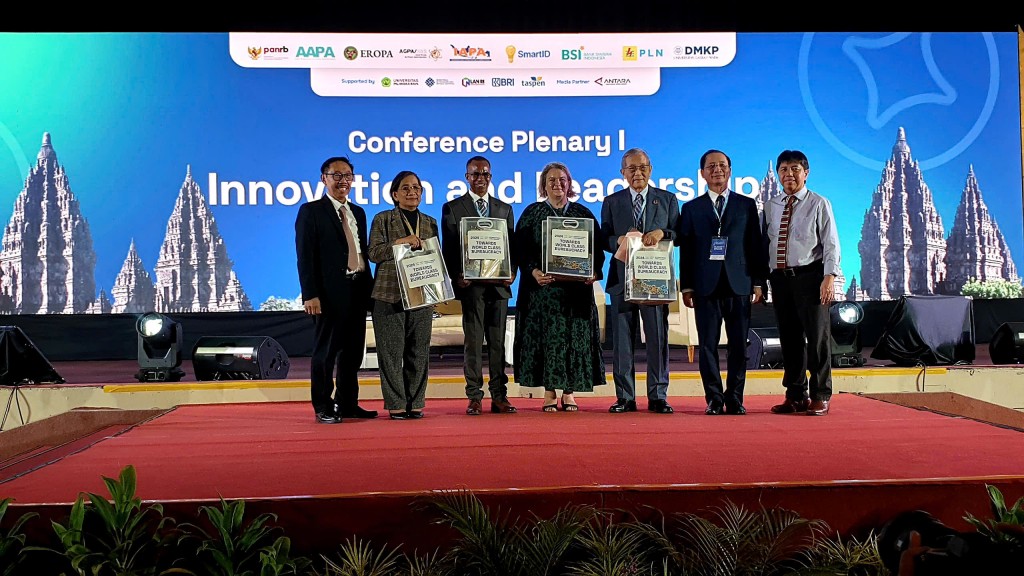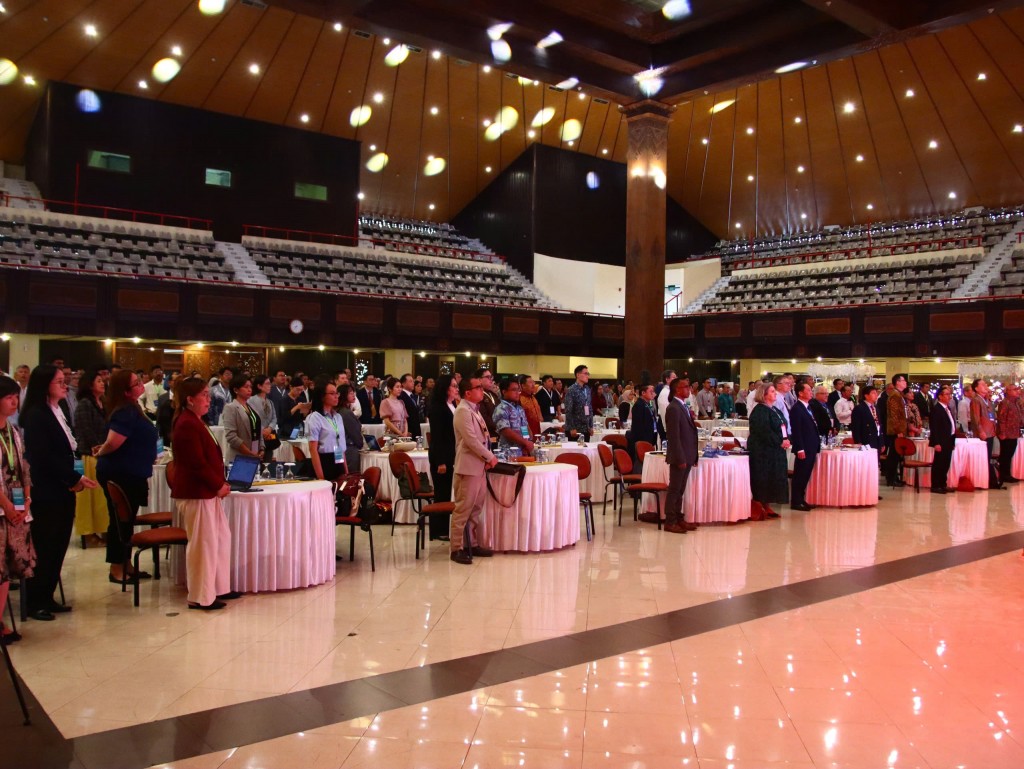With the theme “Towards World Class Bureaucracy,” the 2024 annual conference of the Eastern Regional Organization for Public Administration (EROPA) opened on November 5 in Yogyakarta, Indonesia. This event is jointly organized by EROPA, the Asian Association for Public Administration (AAPA), the Asian Group for Public Administration (AGPA), and the Indonesian Association for Public Administration (IAPA). Assoc. Prof. Dr. Nguyen Ba Chien, President of the National Academy of Public Administration (NAPA) of Viet Nam and Chairperson of the EROPA Executive Council, delivered the opening remarks.
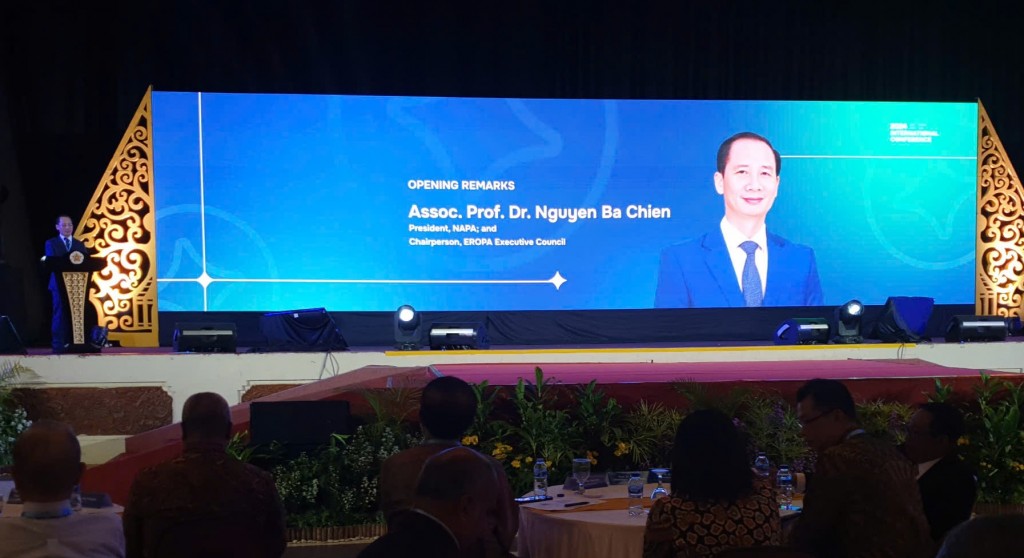
Assoc. Prof. Dr. Nguyen Ba Chien, President of the National Academy of Public Administration (NAPA) of Viet Nam and Chairperson of the EROPA Executive Council, delivering the opening remarks.
In his opening remarks, Assoc. Prof. Dr. Nguyen Ba Chien warmly extended his warmest welcome to all participants attending the conference and emphasized the significance of the conference’s theme, “Towards World Class Bureaucracy.” He highlighted that the collaboration between EROPA, AAPA, AGPA, and IAPA exemplifies the strong spirit of close cooperation and unity of will among the organizations which serve as bridges for knowledge sharing and creation and catalysts for reform and innovation in public management across Asia and the Asia-Pacific region. All work toward development of administrative sciences, build high-quality bureaucracy in each country, and contribute to peace, stability, prosperity, and sustainable development within the region and around the world
According to Assoc. Prof. Dr. Nguyen Ba Chien, Chairperson of the EROPA Executive Council, building world-class bureaucracy is not merely an idealistic goal; it is a practical necessity, a strategy to achieve a professional, modern public service in each member country, which, in turn, enhances the quality of life of the people and promotes sustainable socio-economic development. He mentioned eight sub-themes for discussion during the conference, which are as follows:
(1) Digital Transformation and Bureaucracy: Technology is not only a tool but a powerful driver for transformation and enhancement of effectiveness and transparency of the bureaucracy. How to utilize digital transformation to improve public services and ease the interactions of citizens and businesses with the government?
(2) Data-driven Policy Making: Data-driven policy making is becoming an important trend and brings new opportunities to improve the effectiveness and soundness of decisions. Data is not merely information; it provides insights that guide decisions and policies and needs to be leveraged to enhance the quality and feasibility of political decisions and policies.
(3) Bureaucratic Entrepreneurship, Innovation, and Street-level Bureaucracy: Promoting creative thinking and actively improving processes, services, and products, along with the application of new technologies to boost productivity, efficiency, and responsiveness in public organizations. This subtheme also highlights the role of street-level public servants in policy implementation and decision-making, enhancing flexibility, innovation, and responsiveness in public service delivery.
(4) Leadership in VUCA bureaucracy: It is a critical topic for discussion on the enhancement of bureaucracy. Leadership is essential in a volatile, uncertain, complex, and ambiguous world, where challenges are unprecedented. Leaders are crucial sources of inspiration, fostering creativity and building trust to adapt to changes, overcome challenges, and ensure sustainable development.
(5) Post-Pandemic Bureaucracy: COVID-19 has taught countries valuable lessons about agility and adaptability of the bureaucracy. We must think deeper about post-pandemic bureaucracy to develop systems and policies that can predict, respond to, and recover from future crises.
(6) Social Inclusion and Social Equity: Social equity must be a central factor in building world class bureaucracy. A world class bureaucracy not only creates a fair environment but also reinforces citizens’ trust in government, thus improving the effectiveness and quality of public services.
(7) Public Values: Discussions in the conference will cover core public values such as ethics, transparency, and accountability. These values are fundamental for fostering public trust and form the foundation of sustainable bureaucracy.
(8) Risk and Crisis Management: Risk and crisis management is critical in building community resilience. The conference will discuss effective strategies for managing risks and crises, including disaster management, environmental protection, and ensuring security for all.
Assoc. Prof. Dr. Nguyen Ba Chien looks forward to profound discussions, creative solutions, and new connections throughout this conference. He strongly believes that the spirit of cooperation and unity of will provides a solid foundation for EROPA, AAPA, AGPA, and IAPA’s practical, collective actions and solutions to regional and national challenges. This holds particular significance in the context of globalization and multi-polarization, peaceful development, which is especially evident in Asia and the Asia-Pacific region. In the current context, full of intertwined opportunities and challenges, world-class bureaucracy is the key to ensuring peace, stability, prosperity, and sustainable development in the region.
Speaking on behalf of AAPA and IAPA, Prof. Dr. Agus Pramusinto, President of both AAPA and IAPA, emphasized in his opening remarks the significance of the conference theme “Towards World Class Bureaucracy” in the face of an increasingly complex world characterized by volatility, uncertainty, complexity, and ambiguity (VUCA). The urgency of studying and reforming public administration has never been greater.
Prof. Dr. Agus Pramusinto highlighted that an efficient and effective bureaucracy is essential for a nation’s development, ensuring optimal use of resources, reducing waste, and enhancing government performance in service delivery. Through transparent and accountable systems, countries can significantly reduce corruption, building public trust and strengthening the foundation of our society. Bureaucratic reform is also vital in enhancing the skills and capabilities of our public sector workforce, ensuring they remain competitive and innovative amidst global changes.
Representing AGPA, Prof. Dr. Eko Prasojo, President of AGPA, emphasized that public administration is the key to successful development and economic growth. Various digital instruments such as Al, metaverse, and machine learning will help governments present increasingly high-quality public policies and services. Those opportunities provide greater benefits can also become a new boomerang for public administration. Public administration must carefully choose the right path at the various crossroads currently encountered.
On behalf of the Conference Organizing Committee, Prof. Dr. Wening Udasmoro, Vice President of the University of Gadjah Mada, shared that the conference serves as a valuable opportunity to bring together leaders, scholars, and public administration experts from across the Asia-Pacific region. In a world that is increasingly interconnected yet filled with volatility, uncertainty, complexity, and ambiguity, building a resilient and efficient administrative apparatus has never been more urgent. The conference will explore in-depth insights and foster collaboration to develop innovative solutions that will shape bureaucracy capable of addressing contemporary challenges in each country, supporting sustainable development throughout the region and globally.
The EROPA–AAPA–IAPA–AGPA Conference held in Yogyakarta, Indonesia, from November 5-7, 2024, attracted over 500 participants from Asia and the Asia-Pacific region. The conference features four plenary sessions, three specialized workshops, and 39 parallel sessions, with 273 papers and presentations on academic and in-depth research.
The Eastern Regional Organization for Public Administration (EROPA) is the first organization in Asia and the Pacific region aimed at advancing public administration and promoting socio-economic development in the region through the promotion of study, practice and status of public administration and management. EROPA currently comprises 10 State Members, including Japan, the Philippines, Thailand, the Republic of Korea, Iran, Indonesia, Nepal, India, China, and Vietnam. EROPA also includes 58 insitutes and school of public administration and universities, organizations in public administration, and 229 individual members. Since 1991, the National Academy of Public Administration (Ministry of Home Affairs) has been a State Member of EROPA. Over the past 30 years, NAPA has actively participated and established its expertise and reputation within EROPA. Assoc. Prof. Dr. Nguyen Ba Chien, NAPA President, serves as the Chairperson of the EROPA Executive Council for the 2024-2025 term.
Some photos at the Conference:
